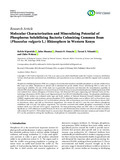Molecular Characterization and Mineralizing Potential of Phosphorus Solubilizing Bacteria Colonizing Common Bean (Phaseolus vulgaris L.) Rhizosphere in Western Kenya

View/
Date
2023-03-01Author
Kiprotich, Kelvin
Muoma, John
Omayio, Dennis O.
Ndombi, Tavasi S.
Wekesa, Clabe
Metadata
Show full item recordAbstract
Phosphorus solubilizing bacteria (PSB) are a category of microbes that transform insoluble phosphates in soil into soluble forms that crops can utilize. Phosphorus in natural soils is abundant but poorly soluble. Hence, introducing PSB is a safer way of improving its solubility. The aim of this study was to genetically characterize and determine the mineralization capability of selected PSB colonizing rhizospheres of common beans in Western Kenya. Seven potential phosphorus solubilizing bacteria (PSB) were isolated from various subregions of Western Kenya. 16S ribosomal RNA gene sequencing and National Center for Biotechnology Information (NCBI), Basic Local Alignment Search Tool (BLAST) identified the isolates. The phosphate solubilization potential of the isolates was evaluated under agar and broth medium of National Botanical Research Institute’s phosphate (NBRIP) supplemented with tricalcium calcium phosphate (TCP). Identified isolates were as follows: KK3 as Enterobacter mori, B5 (KB5) as Pseudomonas kribbensis, KV1 as Enterobacter asburiae, KB3 as Enterobacter mori, KK1 as Enterobacter cloacae, KBU as Enterobacter tabaci, and KB2 as Enterobacter bugandensis. The strains B5 and KV1 were the most effective phosphorus solubilizers with 4.16 and 3.64 indices, respectively. The microbes converted total soluble phosphate concentration in broth medium which was 1395 and 1471 P μg/mL, respectively. The least performing isolate was KBU with a 2.34 solubility index. Significant ( ≤ 0.05) differences in plant biomass for Rose coco and Mwitemania bean varieties were observed under inoculation with isolates B5 and KV1. PSB isolates found in common bean rhizospheres exhibited molecular variations and isolates B5 and KV1 are the potential in solving the insufficiency of phosphorus for sustainable crop production.
URI
https://www.hindawi.com/journals/ijmicro/2023/6668097/https://www.hindawi.com/journals/ijmicro/2023/6668097/#:~:text=https%3A//doi.org/10.1155/2023/6668097
http://ir-library.mmust.ac.ke:8080/xmlui/handle/123456789/2166
Collections
- Gold Collection [1031]
